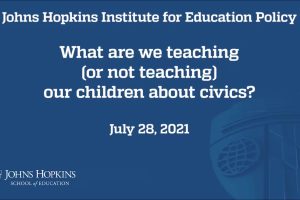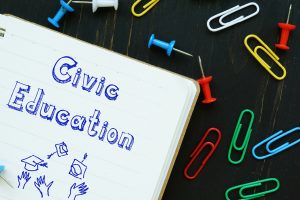A well-functioning democratic society requires its citizens to have certain knowledge, skills, and dispositions.
Although we rely on a variety of institutions, such as families, religious communities, and nonprofit organizations to provide civic formation to young people, democracies around the world depend on K-12 education as the primary vehicle for the next generation’s citizens.
Successful civic formation includes four key indicators:
- Political knowledge: Mastering knowledge about the United States’ history and government, as well as world history, geography, economics, philosophy, and religion.
- Political skills: The capacity to interpret legislation, write to elected officials, analyze news stories.
- Habit of civic engagement: Volunteering and contributing to civil society and to democratic elections.
- Practice of civil tolerance: Holding strong beliefs while honoring those of others.
The Johns Hopkins Institute for Education Policy uses three tools to examine the extent to which schools are supporting young people’s civic formation: the Knowledge Map™ for social studies, the Teacher Survey of Curriculum Use, and the School Culture 360™ Survey. Our social studies Knowledge Map examines the formal materials used as part of the curriculum; our Teacher Survey of Curriculum Use calls attention to teacher instructional practices; and our School Culture 360 Survey highlights the extent to which opportunities for deliberation and debate are offered to students.
These three tools help educators and school leaders learn in what ways they need to amend curriculum and practices to ensure students are offered opportunities to master critical domains of civic knowledge, encounter diverse perspectives, deliberate and debate ideas and policies, and exercise agency in the wider world.
Learn more about our civics initiatives.
-
Knowledge Map Findings
Read the “Social Studies Knowledge Map Findings Brief” and explore our evaluation of various social studies curricula.

-
What We’re Teaching
Watch the webinar, titled “What are we teaching (or not teaching) our children about civics?”

-
For Parents: Civics at Home
Check out this resource on easy ways for families to engage in civics education.

Knowledge Map Findings
Read the “Social Studies Knowledge Map Findings Brief” and explore our evaluation of various social studies curricula.

What We’re Teaching
Watch the webinar, titled “What are we teaching (or not teaching) our children about civics?”

For Parents: Civics at Home
Check out this resource on easy ways for families to engage in civics education.
